Bull Terriers Dog
- February 2, 2024
- 0 comment
The Bull Terrier dog is a breed celebrated for its distinct and charismatic personality, making it a favorite among dog enthusiasts. Renowned for its unique appearance, which includes an egg-shaped head, small triangular eyes, and upright, pointed ears, Bull Terriers are instantly recognizable. These dogs have a history dating back to the early 19th century, originally bred for bull-baiting and dogfighting but later refined to become more gentle and affectionate companions. Their playful, energetic nature and unwavering loyalty make them excellent family pets.
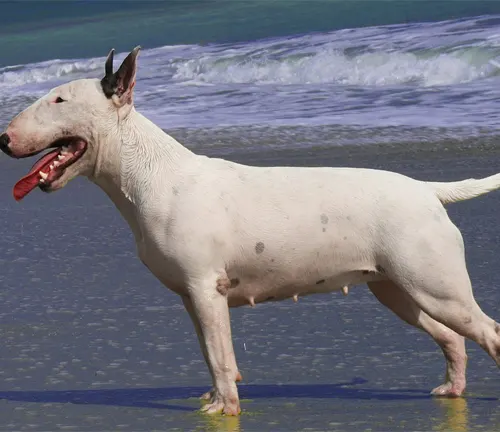
However, they require regular exercise, grooming, and early training and socialization to thrive. Bull Terriers can be prone to specific health issues, including deafness and skin conditions, but with proper care and regular vet check-ups, they can live happy and fulfilling lives. With their endearing appearance and engaging personality, Bull Terriers have earned a special place in the hearts of dog lovers worldwide.
| Specification | Details |
|---|---|
| Breed Name | Bull Terrier |
| Size | Medium to Large |
| Weight | 50-70 pounds (22-31 kg) |
| Height (at the shoulder) | 20-24 inches (51-61 cm) |
| Lifespan | 10-12 years |
| Coat | Short and sleek |
| Coat Colors | White, colored, or with markings |
| Distinctive Features | Egg-shaped head, small triangular eyes, pointed upright ears |
| Temperament | Playful, energetic, loyal, affectionate |
| Exercise Needs | High (requires daily physical activity) |
| Grooming | Low maintenance (weekly brushing) |
| Training | Responsive to positive reinforcement, early training and socialization are essential |
| Health Concerns | Deafness (especially in white Bull Terriers), skin conditions, heart problems, kidney disease, patellar luxation, hypothyroidism, eye conditions |
| Suitable For | Active families, experienced dog owners, those who can provide exercise and socialization |
| Notable Traits | Clownish personality, love for human interaction, and a strong desire to be part of the family |
| Popularity | A beloved breed among dog enthusiasts for its unique appearance and engaging personality |
A Unique and Lively Canine Companion

When it comes to choosing a furry friend to bring into your home, there are countless breeds to consider. One breed that stands out for its unique appearance and lively personality is the Bull Terrier. In this article, we will delve into the fascinating world of Bull Terriers, exploring their history, characteristics, care requirements, and much more. Join us on this journey to discover why Bull Terriers make wonderful companions for dog lovers.
A Brief History of Bull Terriers
Bull Terriers have a rich history that dates back to the early 19th century in England. Initially bred for bull-baiting and dogfighting, these feisty canines have come a long way since then. In the mid-1800s, breeders crossed Bulldogs with the now-extinct White English Terrier to create a new, gentler breed – the Bull Terrier. This selective breeding aimed to maintain the tenacious spirit of the Bulldog while reducing its aggressiveness, resulting in the Bull Terrier we know today.
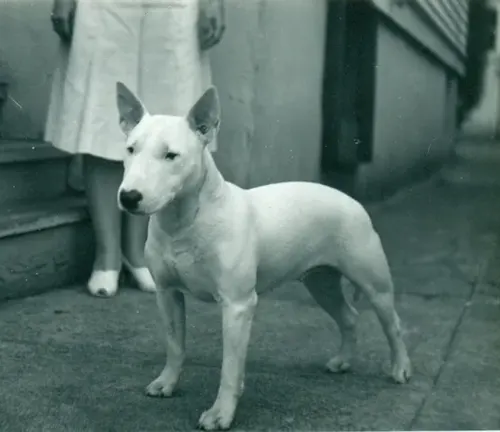
Distinctive Appearance
One of the Bull Terrier’s most striking features is its unique appearance. With their egg-shaped heads and muscular bodies, they are instantly recognizable. These dogs come in two varieties: the standard Bull Terrier and the miniature Bull Terrier. Both have short, sleek coats that can be white or colored, often with distinctive markings. Their small, triangular eyes give them an alert and mischievous expression, adding to their charm.
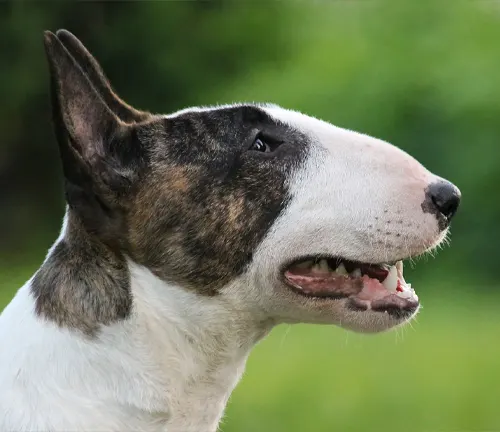
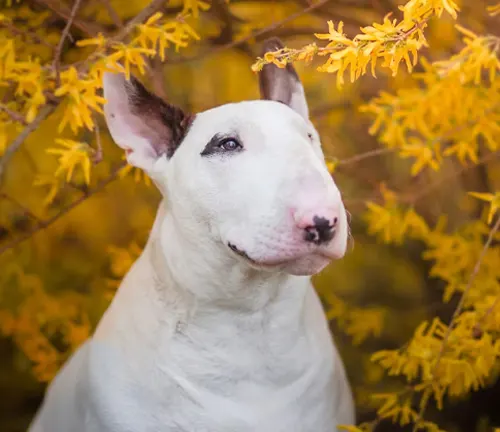
The Bull Terrier’s Ears
One defining feature of Bull Terriers is their upright, pointed ears. These stand like antennas on their heads, contributing to their distinctive appearance. While they might look fierce, Bull Terriers are known for their friendly and affectionate nature.
Temperament and Personality
Bull Terriers are often described as playful, energetic, and loving. They have a strong desire to be around people, making them excellent family pets. Their enthusiasm for life is infectious, and they can be quite entertaining with their clownish antics. However, it’s essential to provide them with plenty of mental and physical stimulation to prevent boredom, as they are prone to destructive behavior if left idle.
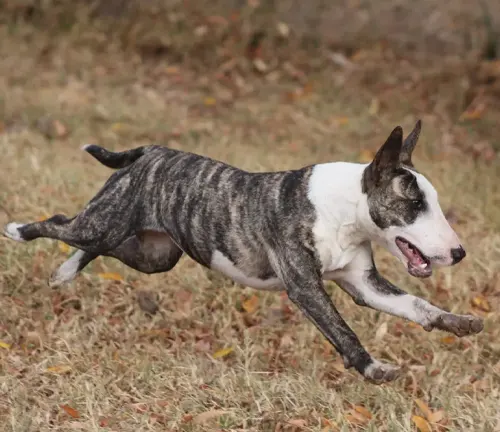
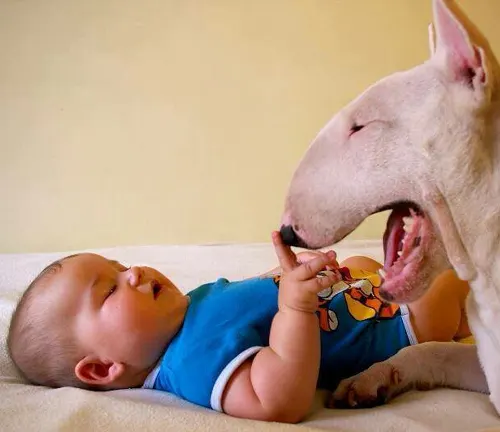
Bull Terriers and Children
Despite their energetic nature, Bull Terriers tend to get along well with children. They are generally patient and protective, making them great companions for families with kids. However, proper socialization from a young age is crucial to ensure they develop into well-adjusted adults.
Care and Maintenance
Taking care of a Bull Terrier requires commitment and dedication. Here are some essential aspects to consider:
Exercise Needs
Bull Terriers are highly active dogs that require regular physical activity to stay happy and healthy. Daily walks, playtime in a secure yard, and interactive games are essential to keep them engaged and prevent boredom, which can lead to destructive behavior.
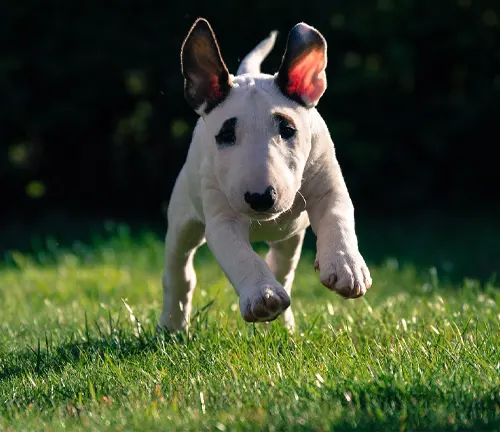
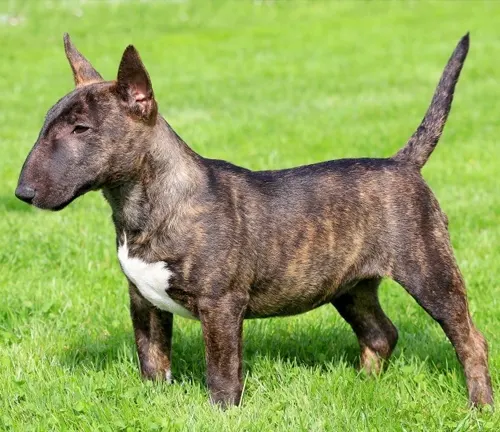
Grooming
Grooming is relatively straightforward with Bull Terriers, thanks to their short, sleek coats. Weekly brushing and an occasional bath are usually sufficient to keep their coat looking its best. However, paying attention to their overall hygiene, including ear cleaning and dental care, is essential for their well-being.
Training and Socialization
Training and socialization are crucial for Bull Terriers. These dogs respond well to positive reinforcement methods, such as treats and praise. Early training and exposure to various people and situations help them become well-adjusted and obedient pets. They thrive on interaction and being a part of the family, so socialization is key to their development.
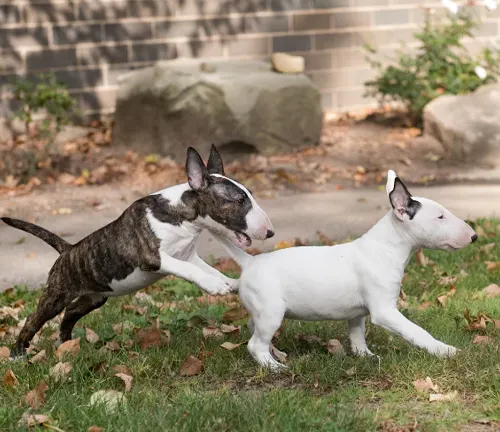
Health Considerations
Like all breeds, Bull Terriers have specific health concerns to be aware of. Some of the most common issues include:
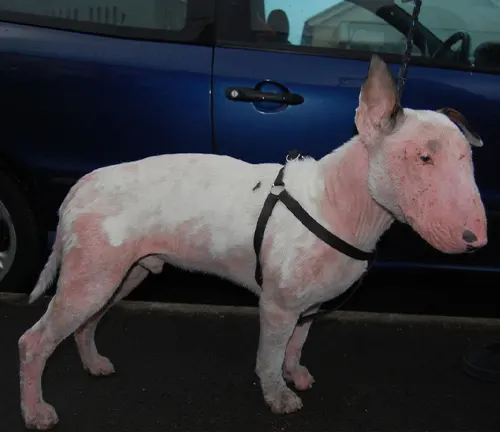


- Deafness: Bull Terriers, especially the white ones, are prone to congenital deafness. It’s essential to have regular hearing tests done to monitor their auditory health.
- Skin Conditions: Bull Terriers can be sensitive to various skin conditions, including allergies and irritations. Maintaining proper hygiene, a balanced diet, and regular grooming can help prevent skin problems.
- Heart Problems: Some Bull Terriers can be susceptible to certain heart conditions, such as mitral valve disease. Regular check-ups with a veterinarian are crucial to detect and manage any potential heart issues early.
- Kidney Disease: Like many breeds, Bull Terriers can be prone to kidney disease as they age. Monitoring their kidney function through routine blood tests can help catch any problems early and manage them effectively.
- Patellar Luxation: This condition involves the dislocation of the kneecap and can affect Bull Terriers. It’s important to watch for any signs of lameness or discomfort and consult a vet if you suspect this issue.
- Hypothyroidism: Some Bull Terriers may develop hypothyroidism, a condition where the thyroid gland doesn’t produce enough hormones. This can lead to various health problems, including weight gain and skin issues. Regular thyroid function tests can help diagnose and manage this condition.
- Eye Conditions: Bull Terriers may be prone to certain eye conditions, such as cherry eye (prolapsed gland of the third eyelid) or cataracts. Regular eye check-ups with a veterinarian can help identify and treat these issues promptly.
Different Species
Standard Bull Terrier
This is the traditional and more common variety of the Bull Terrier. It is known for its distinctive egg-shaped head, small triangular eyes, and upright, pointed ears. Standard Bull Terriers typically have a muscular build and a playful yet affectionate personality.
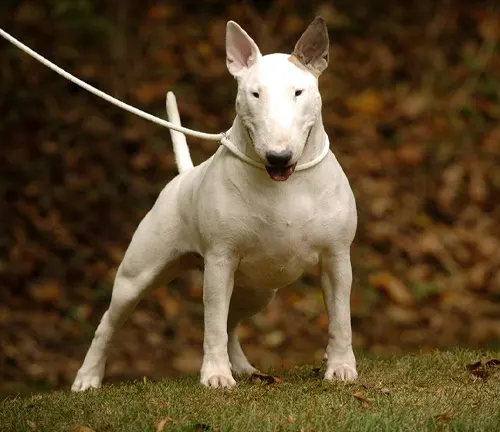
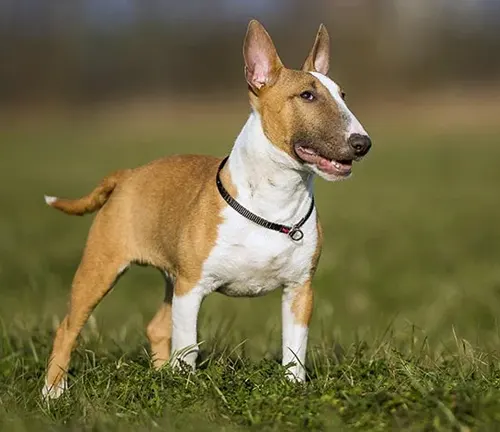
Miniature Bull Terrier
The miniature Bull Terrier is a smaller version of the standard Bull Terrier. It shares many of the same physical characteristics but is more compact in size. Miniature Bull Terriers are equally lively and affectionate, making them suitable for those who prefer a smaller canine companion.
Frequently Asked Question (FAQs)
- Are Bull Terriers aggressive by nature?
Bull Terriers are not inherently aggressive by nature. Their temperament depends on various factors, including genetics, socialization, and training. Properly raised and trained Bull Terriers are typically friendly and affectionate. - Do Bull Terriers get along with children?
Bull Terriers can be good with children when properly socialized and supervised. They are known for their playful and protective nature, making them suitable family pets. - Are Bull Terriers good for first-time dog owners?
Bull Terriers can be a challenge for first-time dog owners due to their strong-willed nature. Experienced owners or those willing to invest in training may find them a rewarding choice. - Do Bull Terriers require a lot of exercise?
Yes, Bull Terriers are an active breed and require daily exercise to stay happy and healthy. Regular walks and playtime are essential. - Are Bull Terriers good with other pets?
With proper socialization, Bull Terriers can get along with other pets. However, they may have a strong prey drive, so supervision is essential. - Do Bull Terriers shed a lot?
Bull Terriers have short, sleek coats that shed minimally. Regular brushing can help keep shedding to a minimum. - How long do Bull Terriers live on average?
The average lifespan of a Bull Terrier is around 10 to 12 years. - Do Bull Terriers have any specific grooming needs?
Bull Terriers have low grooming needs. Weekly brushing, occasional baths, and routine ear and dental care are typically sufficient. - Are Bull Terriers prone to any health issues?
Bull Terriers can be prone to specific health issues, including deafness, skin conditions, heart problems, kidney disease, patellar luxation, hypothyroidism, and certain eye conditions. - Can Bull Terriers adapt to apartment living?
Bull Terriers can adapt to apartment living if they receive adequate exercise and mental stimulation. They do best in homes with access to outdoor play areas. - What is the difference between standard and miniature Bull Terriers?
The main difference is size. Standard Bull Terriers are larger, while miniature Bull Terriers are smaller in stature but share the same breed traits and personality. - Are Bull Terriers known for being stubborn during training?
Bull Terriers can be strong-willed, and some may exhibit stubbornness during training. Consistent and positive reinforcement training methods are recommended. - Do Bull Terriers bark a lot?
Bull Terriers are not known for excessive barking, but they may vocalize when excited or to alert their owners. - How do I socialize my Bull Terrier properly?
Early socialization with various people, animals, and environments is key to raising a well-adjusted Bull Terrier. Puppy socialization classes can be beneficial. - What is the best diet for a Bull Terrier?
A balanced and high-quality dog food that suits your Bull Terrier’s age, activity level, and dietary needs is ideal. Consult with a veterinarian for specific recommendations. - What kind of exercise do Bull Terriers enjoy most?
Bull Terriers enjoy activities that challenge their physical and mental abilities, such as interactive games, agility training, and outdoor play. - Are Bull Terriers good watchdogs?
Bull Terriers are alert and protective, making them effective watchdogs. They will alert their owners to potential intruders. - Do Bull Terriers have any specific dietary restrictions?
Some Bull Terriers may have food allergies or sensitivities, so it’s essential to monitor their diet and consult with a vet if any issues arise. - How can I prevent my Bull Terrier from digging in the yard?
Providing your Bull Terrier with ample exercise, mental stimulation, and designated digging areas can help curb this behavior. - What is the average size of a Bull Terrier’s litter?
The average litter size for Bull Terriers is around 5 to 8 puppies, but it can vary.




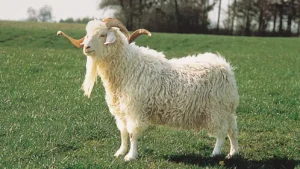








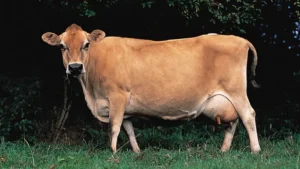
Leave your comment